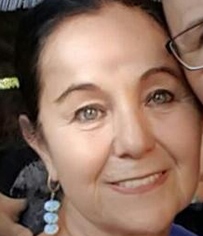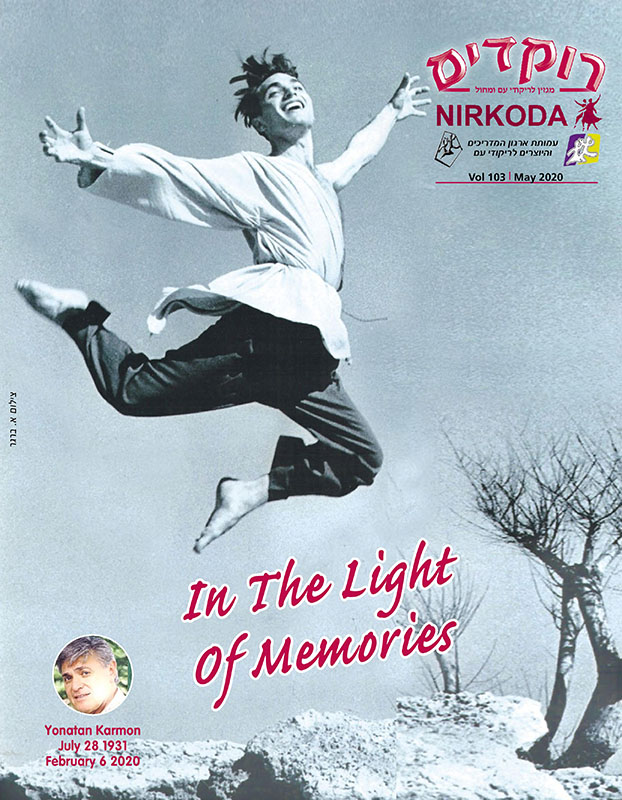- Home
- Rokdim Nirkoda 103
- The Soul Was Elated
Beloved Yonatan is connected to our past and that world will remain in the memory of his dancers, as well as the many singers and artists who have shared a wonderful and unique path together with him and thanks to them all, the world has fully known him.
For me, Yonatan was a life coach, a charming man, an interesting and loyal friend! Thanks to him, I’ve had a long and meaningful life experience. It was the same for all those who danced, sang and played under his baton over the years.
The experiences during the period I danced with Yonatan are engraved in my memory and they are beautiful and rich and are a unique and wonderful part of my life.
The huge symphony that Yonatan created in dance performances, song and music, along with his dance troupes and later on at the Karmiel Dance Festivals – they are unparalleled in our dance history. It’s a long and wonderful journey which is a journey of an entire lifetime.
My path into the worldwide dance experience with Yonatan Karmon went through the Emek Hefer Troupe, under the guidance of Yankele Dekel z”l, the 1962 [Eighth World Youth Festival held in] Helsinki, Finland with Drora Alon, continuing with “Ha’Lehaka Ha’Merkazit – The Central Troupe”, established by the Histadrut, under the direction of Tirza Hodes. Odeda Kruvi kept the troupe together until the arrival of Yonatan Karmon, who took us by storm! Initially it was with Tirza Hodes, under the auspices of the Histadrut and later, as the independent Lehakat Karmon – Karmon Dance Troupe.
Yonatan faced new challenges with his dancers. His great love of the country, its tradition, its landscape, its holidays, the melodies and the songs of our poets – is well known. Together with his great love for classical dance, modern and folk dance, he created a new style, even for the dancers who coped with the training routines from the “corner” with the concepts of the classical dance world, and with Yonatan’s demand for perfectionism on the one hand and an internal understanding of the mental and emotional meanings of his dance, on the other.
We danced with the sense that we were on the forefront of something new, exciting, interesting and challenging. Yonatan was always focused on his work which resulted in wonderful creations that were uniquely his own.
They were drawn from the traditional sources and current events in the country, and sought to innovate, grow and enrich the content and style on stage.
Yonatan knew where he was going and how he wanted us, the dancers, to bring the young nation of Israel to every place in the world – the Israel that relies on its ancient origins, but in a new style facing the harsh realities of everyday life.
The rehearsals were not easy. Yonatan’s “creative pains” also affected our tired feet and aching body, but our soul was elated. The profound experience of working with a wonderful creator and artist like him was huge compensation for every effort or physical suffering.
Yonatan managed to put together “Music Halls” – a perfect format for dance and song performances with which we traveled for a year or more and with which we respectfully represented our country at every place in the world, in the most famous halls in the United States, Europe and South Africa.
The troupe’s performances included singers such as Ilan and Ilanit, Yaffa Yarkoni, Shoshana Damari, Mike Brant, Nechama Hendel, Geula Gil, Ha’Chalonot Ha’Gvohim (The High Window)s, HaDudaim (The Dudaim), Habreira Hativit, Ran Eliran, Itamar Cohen, Boaz Sharabi at the beginning of his career, Chamishiat HaCarmelim – Oshik [Levy], (his brother) Lolik, Hanan [Goldblatt], Michal Tal and Ruti (Ruth) Bickel and others, with a professional orchestra from around Israel, conducted by(the great!) Ziko Graziani. There were stunning and symbolic sets, and costumes designed by designers such as Lydia Pincus Gany.
Great artists visited us backstage. We felt that we were on a great mission with the dances we took onto the stage and also in the conversations and “workshops” we went through on courtesy, dress and behavior.
Yonatan brought us to the world’s biggest stages – The “Olympia” in Paris, “Albert Hall” in London, “The Opera” in Milan and to “Broadway” and “Madison Square Garden” in New York. The long and glorious journeys have shaped our paths and our personalities, formed lifelong close friendships and opened a different perspective to the world and life in it.
We were wonderful ambassadors of the State of Israel during difficult times and we were received with love and respect. The audience voted with their feet and the great halls were filled with excitement.
Even after the Lehaka dissolved, I continued to meet with Yonatan in the United States, where I lived for ten years. When Yonatan arrived with his musical shows in Hebrew and English, he used to visit me at the United Jewish Appeal, where I worked. This is how we continued our special relationship for years.
When I returned to Israel, I was assigned to manage the folk dance section of the Histadrut. This was on the recommendation of Yonatan and Tirtza Hodes, who retired at that time.
By virtue of the roles and partnership of the Histadrut at the Karmiel Festival, I directed and produced a significant number of dance events at the Festival, in Yonathan Karmon’s inspired and guided grandiose production.
Our friendship strengthened and deepened, withstood the test of time and undoubtedly enriched my world. Yonatan was a brother and friend and a member of my family. The day before he died, he asked to meet with me …
Yonatan, we didn’t get to meet, but I’m not saying goodbye to you because I will always remember you as alive and well!
”So I’ll go, in the light of memories
Therefore, I understand, the deviating path of my life
Because there is silence at the end of the storms
There is hidden light with happiness that vanishes”
Yonatan Karmon greatly influenced the style of Israeli dance for the stage. Many instructors and choreographers, former dancers, and students of the “Choreographers’ Chamber” he founded in the mid-1990s continue to create in his style and spirit.
The Karmiel Festival that he conceived, established and artistically directed for the first 13 years, shaped its content and character, is an example of huge festivals featuring diverse dance styles from all over the world, with dancers from all of the Diaspora communities and the ethnic groups living here. There are both young and old participants in folk dancing, folk singing, huge harkadot (dance sessions), workshops, a combination of old and new, and a huge variety of programs that make it a pilgrimage for Israeli popular culture enthusiasts.
Short Stories
Deodorant spray
Rehearsals for a 1967 performance tour, held in the Hapoel Arena on Ussishkin Street on the basketball court, were intense and arduous. Perspiration flowed. The Lehaka members were comprised of people from kibbutzim, moshavim and cities…. One day, Yonatan stopped the rehearsal, took out deodorant spray from his bag and delivered the message to the members of the Lehaka (the boys of course!)
During the next rehearsal, the hall was covered with clouds of deodorant. The boys “learned” their lesson and sprayed themselves at the end of each dance. We choked! Again, Yonatan stopped the rehearsal and explained: “You put the deodorant on once, after a shower and not after every dance …”
Diets
Yonatan, the perfectionist, paid attention to outer appearance no less than the show with all its details, and would follow up on unnecessary weight gain. We were fearful and tried every possible diet: bread diet, salad diet, steak and salad, fasting and we especially liked the Hawaiian salad which was made up of lettuce or pineapple, with cottage cheese or yogurt. Needless to say it was harmful, but to be sure, we always wore black before meetings with him, because black was slimming.
Shopping
Whenever we got to a big city, the shopping spree began, and the catchwords were: “Where did you buy it? How much did it cost? And how do you get from there to the hotel?”
Because we stayed in hotels with a kitchenette, we bought utensils and food for extended periods. One day, two guys [in the troupe] arrived and announced that they found and bought super cheap cans of tuna. “Why so inexpensive…” it turned out that the tuna was for cats…
Afterwards, on the way to South Africa, we landed in London. The suitcases were greatly overweight. The guys (not all), sat in the airport and removed all the pans and utensils that they bought just days earlier. Yonatan went crazy from the “refugee camp” scene.
Fines
There was a fining procedure for coming late. There were laughs on stage. The sharp eye of Gavri Levi z”l, who was the Lehaka’s director, did not miss any of the mischievous acts that jeopardized our proper functioning. I am reminded of an amusing case. In the wonderful and well-known dance, “Rikud HaDayagim – Dance of the Fishermen,” by Yonatan, the girls were seated and the boys stood in an awaking position before going fishing. It was quiet on stage. The curtain was closed. Rivka Michaeli, the MC, told the audience about the fisherman’s life in Israel. The curtain slowly opened and Natan Okev z”l, a stunning and beloved dancer, bounded onto the stage and shouted: “Guys, I found a store … and with the sight of the curtain’s opening, he abruptly froze like a fisherman pillar of salt. The fine was not long in coming…
Mishaps
Yehudit Perry, the former “Water Queen,” joined the troupe in the United States. Beautiful and cool, a bit spacey … not so strict about the half ponytail that was typical of the troupe’s girls.
In the finale dance, “Keshoshana Bein Hachochim – As A Rose among the Thorns”, the girls sat in a row and the boys jumped over them. During one of the jumps, a guy touched Yehudit‘s loose ponytail, which was left hanging in the air by the guys…
Cards
The boys – dancers, singers, stage people, found a way to “pass the time” on planes, trains and buses. They used to improvise tables with luggage and they spent their time playing card games. One summer day in Europe, the bus crashed and we had to wait on the road for it to be repaired. The card players, as usual, sat down on the grass alongside the road and took off their shirts to sunbathe and play. They were so absorbed in the game that they didn’t notice that we had all gotten onto the repaired bus and that the driver started to drive away. The boys running along with their suitcases, without their shirts, is also an amusing memory.
English
Ziko Graziani z”l, the celebrated conductor, joined our group for meals and entertainment. In Philadelphia, we entered a restaurant and Ziko ordered a hamburger. To our question, “Why just a hamburger”? he replied: “This is the only word I know in English.” Since then, we ordered for him!









Comments
התראות